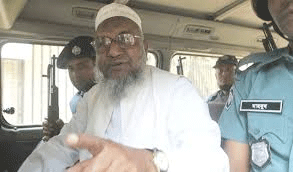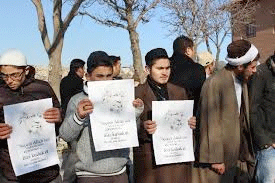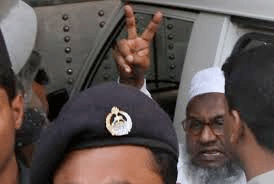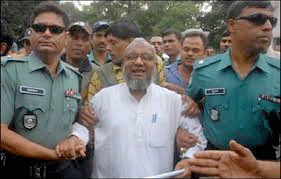Raul Mckenzie —
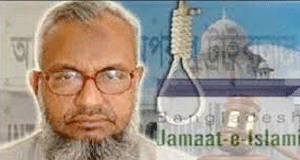 The recent hanging of the Islamist leader Abdul Kader Mollah, who was convicted of atrocities committed during the 1971 war of independence with Pakistan, has stirred up the political situation in Bangladesh. While the critics of Khalida Zia’ Awami League have been quick to pounce on the issue and have condemned the Awami League government of using the International Crimes Tribunals as a tool for political vendetta, the common citizens of Bangladesh have celebrated the execution of Mollah described as the “ butcher of Mirpur” for his role in the 1971 Bangladesh war of liberation from Pakistan, which witnessed killings on a mass scale and the exodus of more than 10 million refugees.
The recent hanging of the Islamist leader Abdul Kader Mollah, who was convicted of atrocities committed during the 1971 war of independence with Pakistan, has stirred up the political situation in Bangladesh. While the critics of Khalida Zia’ Awami League have been quick to pounce on the issue and have condemned the Awami League government of using the International Crimes Tribunals as a tool for political vendetta, the common citizens of Bangladesh have celebrated the execution of Mollah described as the “ butcher of Mirpur” for his role in the 1971 Bangladesh war of liberation from Pakistan, which witnessed killings on a mass scale and the exodus of more than 10 million refugees.
East Pakistan witnessed considerable torment from 1947 -1971
Bangladesh, formerly a part of Pakistan and known then as East Pakistan witnessed considerable torment from 1947 -1971. When India and Pakistan were created in 1947, East Pakistan was separated from West Pakistan by 1,600 km of India. Salman Rushdie aptly wrote later that the new Pakistan was a weird creature, a “fantastic bird of a place, two wings without a body, sundered by the land-mass of its greatest foe, joined by nothing but God” (a reference to the Muslim religion that both wings of Pakistan shared).
Effectively the East suffered a new colonialism: the military rulers based in West Pakistan derided the Bengalis of the East as inferior and non- martial, although they were happy to use export earnings from the jute of the East to fund the infant industries of West Pakistan. A host of socio-economic discriminations were imposed upon the populace of East Pakistan. The capital was in the West, and 90 percent of the top jobs in the civil service were held by West Pakistanis, principally by Punjabis. Even the national language was Urdu, spoken mainly in the West. Bengali was the language of East Pakistanis. The student’s rebellions of 1969 and 1970 were against these discriminatory policies pursued by Pakistan without paying heed to the legitimate concerns to the situation in East Pakistan.
In 1971, the Awaami League, the Dhaka based nationalist party won the national elections in 1971, taking 167 of the 169 seats allotted to East Pakistan. The President of Pakistan Yahya Khan dissatisfied with the results postponed the opening of the National Assembly. Sheikh Mujibur Rehman; leader of the Awami
League proclaimed the independence of Bangladesh on 26 March 1971. On March 25, 1971, the generals arrested Mujib and cracked down on the Bengalis in an orgy of destruction, including rape, slaughter of students and intellectuals who had been vociferous against army rule, and widespread murder, looting and pillage. Between 50,000 and 100,000 people were killed, it’s impossible to be sure because the Pakistan Army did not keep records, and almost 10 million people fled to neighboring India as refugees.
The Jamaat-e-Islami party (present in both West and East Pakistan) supported the unity of the country and opposed separatism in the East in 1970 and 1971.
The Jamaat backed the Pakistani army in 1971 when it brutally suppressed Bengali activists in East Pakistan and then opposed the independence of Bangladesh. The leader of the party Motirur Rehman Nizam till this day stands accused of leading a group called Al-Badr that tortured and executed those fighting against Pakistan in the 1971 war.
Ashraf Hossain, a leader of the Jamaat’s student wing Islaami Chhatra Sangh created the Al badr Militia in the Jamalpur district on April 2, 1971. The Al Badr Razakars were a secret killing squad comparable to SS of the Nazi era, formed w
ith the most dedicated recruits of the student’s wings of the Jamaat. In an editorial published in the Daily Sangram in 1971, Nizami stated: “We believe that our young members will fight side by side with our army to defeat the Hindu forces, and destroy India, and raise the flag of Islam in the whole world.” With arms and weapons supplied by the Pakistani army, the Al Badr paramilitary wing fought pitched battles against the freedom fighters group – the Mukhti
Bahini. Jamaat members were involved in arresting and detaining nationalists, who were later tortured to death. Jamaat members were involved in war crimes of the most inhumane nature. Motiur Rahman Nizami was a key figure in carrying out genocide, murder, arson and looting during the independence war. Delwar Hossain Sayeedi forcibly converted Hindus to Islam, and seized their properties.
Ali Ahsan Mohammad Mujahid was involved in the killings of a number of pro-independence Bangladeshi leaders and intellectuals. Salahuddin Quader Chowdhury played a prominent role in genocide, arson and persecuting people on religious and political grounds. Muhammad Kamaruzzaman was the mastermind behind one of the bloodiest single episodes in the independence war- the “slaughter” of at least 120 unarmed farmers in the remote northern village of Sohagpur which subsequently became known as the “village of widows”.
Abdul Kadir Mollah played a role in the killing of 344 civilians in Dhaka’s Mirpur area earning him the title of Butcher of Mirpur.
The judgements passed by the War Crimes Tribunal have played a major role in finally punishing the guilty and awarding sentences commensurate with the crimes committed. Closure has been provided to the hundreds of survivors of the genocide and the families of survivors. It is significant that the execution of Mollah has been most lamented by the Jamaat e Islami of Pakistan which called him an old and loyal friend—substantiating the direct role that Pakistan played in the genocide through its proxies.
Social sites are abuzz with support for the trials with an overwhelming number of people thanking the government for bringing the war criminals to justice. The violent character of the Jamaat e Islami Bangladesh is again on display in the upsurge of street violence and targeted killings of minorities and Awami League cadres that have been unleashed to protest Mollah’s execution. Those who seek to project his execution as unjustified need to look at him through the eyes of his victims and not pontificate without carrying a single scar left by the Jamaat.
 TheBulletin.ca Journal of Downtown Toronto
TheBulletin.ca Journal of Downtown Toronto
